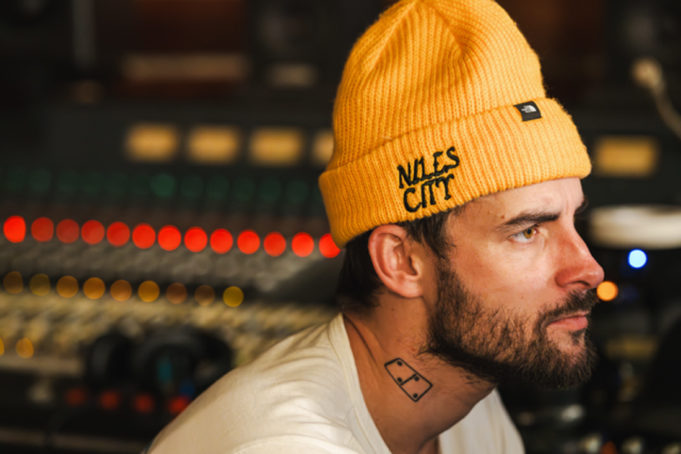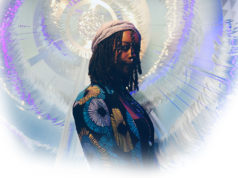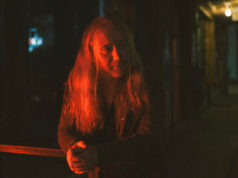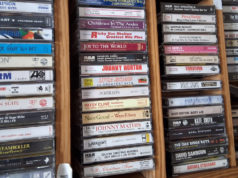You might call this easy listening, but the piece of audio I’ve been really enthralled with lately is Mark Hoppus’ new book, Fahrenheit-182: A Memoir. The Blink-182 bassist and co-frontman’s autobiographical account (read by himself) of his band’s meteoric rise from scrappy SoCal skate-brat trio to their current state of affairs as a multiplatinum-selling pop-punk legacy act really fired up my nostalgia for the era of the band’s early ’90s origin and mid-’90s get-in-the-van-and-play-anywhere ascension. When I think back to that time, everything in my memory has that mid-’90s hyper-saturation, as does this line from Hoppus: “On these tours, my belt never dries.” Hearing that, I felt a lump well up in my throat, thinking about seeing them at Warped Tour ’97, when he would have most certainly had to live with a permanently wet belt.
For me, this was the time just after high school and just prior to the launch of MySpace, the end of an epoch when bands booked shows by calling clubs on the phone, and when he describes how the only way a touring band could be reached was by leaving a message at a venue for them, that time really felt like ancient history.
Today, even booking via email almost feels antiquated. Nearly every band contact I’ve made over the past decade has been via a social media app’s messenger, and even exchanging text messages for interviews and booking feels like an archaic imposition. As for the importance of vans and sweaty belts to a band’s career, the most-watched musicians on Instagram and TikTok — at least in my feeds — tend to be seated, dead-behind-the-eyes virtuosos capable of perfectly replicating every lick ever recorded yet who seem to have never played a note with another human musician. In 2025, is it even possible to promote your music without social media engagement? Does playing live matter?
Robert Ellis, who started his music career in the mid-2000s shortly after dropping out of high school at the age of 17, stepped away entirely from social media at the end of January, clearing his Instagram of posts save for a single set of notes explaining why he was peacing out on the platforms and to please go to his website for show dates and news moving forward. I called him up and asked him how it was going sans social media and if he thought it was possible to make a career in music according to a pre-social media paradigm.
“I mean, it remains to be seen in the grand scheme of things how it is, like, financially,” he said. “I’m in a fortunate situation because I have been doing this since, you know, before [social media] was really a thing, and I was lucky enough to able to build up a base back then. … I know I’m in a lucky place that I feel like I can check out and not take too much of a hit in terms of the amount of people who come to my shows. … I still get emails from almost every promoter that are like, ‘We’d really appreciate it if you’d post about this,’ and now I can just be like, ‘Where do you want me to post?’ ”
Ellis said that he had gotten to the point where Instagram was about as useful to him as it was enjoyable, and neither amounted to much. “There’s, like, the career side. … I don’t necessarily believe that social media does the things that it claims to do. … I don’t necessarily believe that it’s a great tool for even advertising the things I like, mainly just because of the aesthetic, that ‘overwhelming’ quality of the app.”
The app’s avalanche of content — even the stuff that interests him — “is just rotting my fucking brain. … I don’t think it gets information to people in the easy and free democratized way that people think it does.”
Though his manager wasn’t wild about the idea at first, Ellis maintained his hard line. “I feel like I just needed a hard out that would make it look really silly for me to come back,” Ellis said.
Absent his social media accounts, Ellis communicates with his listeners the old-fashioned way: via a monthly newsletter sent to his email subscribers. “I’d rather email them once about the stuff I have going on for the next, like, three months. If you wanna come to a show, mark your calendar and come. I don’t wanna be in the business of trying to remind people every 30 seconds that there’s going to be an announcement tomorrow or whatever.”
At present, he is booked on a tour with St. Vincent for much of the year, with dates scheduled in South America and Europe for the spring and summer. His path to world tours began when he lucked into the right person hearing his self-produced debut (2009’s The Great Re Arranger) at an indie record store (Houston’s Cactus Music), and not long after that, he was releasing his second album, Photographs, on vaunted indie label New West (home to albums by Dwight Yoakam, Patty Griffin, Jason Isbell, and many others). Soon after that, he was touring the world.
But what if he was just starting out today?
“Man, I don’t know how it is for kids getting bands together these days,” he chuckled. “I mean, honestly, if I were 21 today and getting started, I’d probably be on TikTok.” He laughed again. “I also think some of this is like a [tech] fluency issue that we, as older gentlemen of a certain age, we just never actually get good at it and will always appear disingenuous, and I just think I lack fluency in that [online] language.”
His fluent language, obviously, is writing and performing songs for people. And to him, it’s the in-person, communal experience-part of music that matters most. “In my small hometown south of Houston, we were throwing shows at Jasmine Hall, which was like the community center, or Dunbar Park, where we’d rent out the park for a few hundred bucks and then charge tickets, and, I mean, it’s so funny. Some of those bands that were all just, like, other indie bands from the version of my town on the other side of Houston, they played at our community center, and we played theirs. It’s just like this weird little circuit of local people making shows, and I mean … like, that shit still has to be happening all over.”
In Ellis’ estimation, live music, as opposed to scrollable, forgettable video snippets of songs watched on a smartphone, can be transcendent. “Not to be too woo-woo about it, but people who aren’t necessarily interested in meditation can be completely in the moment somewhere for, like, an hour and a half at a show. They’re really special in that way. They just make everyone just lose time.”
But getting back to Instagram and its dead-eyed virtuosos — I keep thinking about this bass player in my feed who has Cedric Bixler-Zavala bangs and plays Primus songs with the anti-panache of a DMV employee rejecting her millionth driver license application — Ellis feels like he’s also escaping the apps’ algorithmic reckoning.
“The algorithm reinforces sameness,” he said. “Say you get all your fans because of one thing. It doesn’t tend to reward delineation. Thinking of those dead-eyed Instagram guitarists, I’m suspicious that Instagram is not only causing people to look and present the same, but I think it’s causing, like, musical quirks in playing that I hear out in the world, and in my mind, I’m like, ‘Oh, that sounds like Instagram guitar.’ ”












